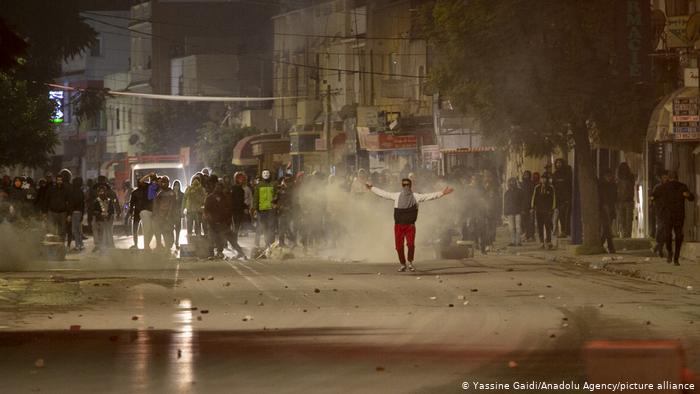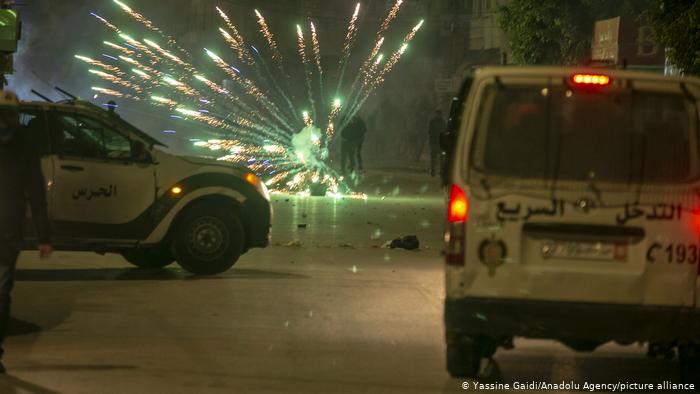Tunis and at least five other Tunisian cities saw violent demonstrations linked to the 10-year anniversary of the Jasmine Revolution that ousted the country's longtime ruler.
Tunisian security forces arrested dozens of young people during consecutive nights of disturbances in several cities, a government spokesman said Sunday.
The protests took place as Tunisia marks the 10th anniversary of the revolution that toppled the late President Zine El Abidine Ben Ali and sparked the Arab Spring uprisings.
Where did the clashes take place?
Violent protests took place in several areas of the capital, Tunis, and the seaside city of Sousse, among others.
Interior Ministry spokesman Khaled Hayouni told the AFP news agency that dozens of young people, mostly aged between 14 and 17, were held after they took to the streets. He accused them of intending to loot and vandalize shopfronts and cars overnight.
الناطق الرسمي باسم الادارة العامة للأمن الوطني وليد حكيمة "القوات الامنية قامت بإيقاف 242 شخصا في كامل تراب الجمهورية ، تورطوا في أعمال تخريب ومحاولات استيلاء ونهب املاك عامة وخاصة الليلة الماضية" #وكالة_وات
— Agence Tunis-Afrique-Presse (@AgenceTAP) January 17, 2021
AgenceTAP put the number arrested at 242, citing a spokesman for the National Security Directorate.

Witnesses in Sousse said security forces fired tear gas to disperse hundreds of angry protesters who blocked roads and burned tires.
There were also night protests and riots in the north of the country.
Tunisia is set to exit a four-day lockdown amid a sharp rise in coronavirus cases. The country has been under a nighttime curfew since October.
What's driving the protests?
A decade after the Jasmine Revolution, Tunisia has made a smooth transition towards democracy, but its economy remains on the verge of bankruptcy.
Tunisia's GDP shrank by 9% last year, consumer prices have spiraled and one-third of young people are unemployed.
The key tourism sector, already on its knees after a string of deadly jihadi attacks in 2015, has been dealt a devastating blow by the coronavirus pandemic.
Tunisia has been rocked by months of anti-government protests.
According to the Tunisian Forum of Economic and Social Rights, more than 1,000 demonstrations took place in November alone.
Months of sit-ins have paralyzed oil and phosphate production for months, putting holes of billions of dollars in the country's budget.
The protests pose a challenge for the government of Hicham Mechichi, who on Saturday reshuffled the cabinet, installing new interior, justice and energy ministers.
Latest Stories
-
Mimmy Yeboah: Blending heritage with global sophistication, confidence redefined through couture
8 mins -
Akufo-Addo commissions 97-km Tema-Mpakadan railway line
36 mins -
Majority requests recall of Parliament
53 mins -
Kanzlsperger and Professor Quartey support WAFA with medical Donation
53 mins -
Gideon Boako donates 10 industrial sewing machines to Yamfo Technical Institute
1 hour -
‘Golden Boy’ Abdul Karim Razak honored at WAFU-B general assembly
1 hour -
Buipewura Jinapor secures Vice Presidential position in National House of Chiefs with record votes
2 hours -
2024 election: I want results to come out like ‘milk and honey’ – Toobu
2 hours -
Ghana’s Henry Bukari hands over chairmanship of ECOWAS Brown Card Council of Bureaux
2 hours -
Residents of Dome-Kwabenya on edge ahead of December elections
2 hours -
Moffy drops new single ‘Wo’, blending culture and modernity
2 hours -
Don’t bring soldiers to polling stations – Martin Kpebu
3 hours -
Ogyeahohuo Yaw Gyebi II retained as President of National House of Chiefs
3 hours -
Embrace ICT to fit in digital world – Ho NYA boss to youth
4 hours -
We don’t want armed soldiers at polling stations – Tanko-Computer
4 hours

